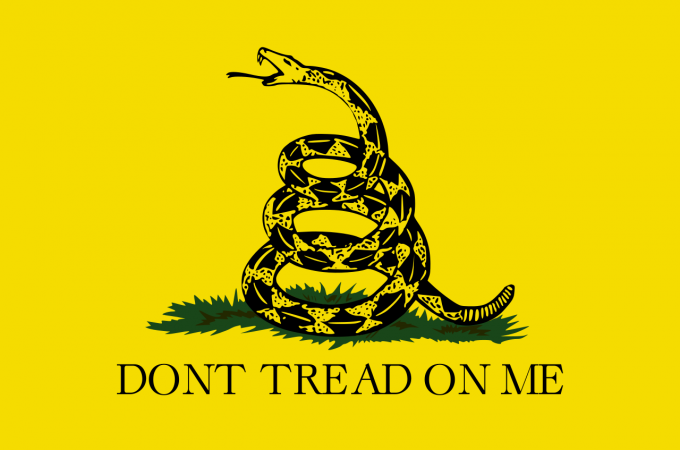So I just published a short rant on the war against independent contractors. I wanted to leave it at that because simple is sometimes better. But there’s more to it, of course.
Like all high level thuggery there is an elegance to the fight. Kind of like the elegance of the Climate Change nonsense. You essentially manipulate people to fight for their own destruction. It’s so elegant that sometimes you have to sit back and say “Whoa. What a thing of diabolical beauty!” Like when a fungus causes a zombie ant to plant itself where it will be an easy meal for the fungus.
Lawmakers become adept at this sort of thing.
So, what’s the next level with the fight against independent contractors? Well, in reality, the unions are just useful idiots in this. They don’t want competition. But there is a much bigger danger for the Powers That Be associated with an economy full of independent contractors.
Independence.
That’s right. Big Brother doesn’t want you to be independent. Independents know something that employees don’t. They know how to do business. In the process of becoming business people they discover how an economy should work and they are quickly able to see that lawmakers are nothing more than mafiosi. You see, independents are not subject to tax withholding. That means they are actually writing checks to pay their taxes. And that means they are aware of just how much the mafiosi demand in tribute.
I’m sorry, employees, but you have no clue. The government gets your money before you do. Some of you even think it’s a bonus check when you get your refund in April. It’s not.
So you see, independents are becoming adults. They are becoming free. This is a massive threat to the PTB. How will they continue to extract their tribute from you when you are actually aware that you’re a slave? So they make use of union idiots to help them wage war against you. To them it’s win-win.
So, don’t vilify Uber, don’t vilify Amazon – that’s what they want you to do. Uber, Lyft, Amazon – they are just giving you opportunities you can turn down if you wish. The villains here are the lawmakers. They want to enslave you.
The question is – will you wake up? Will you grow up? Will you buy the narrative? Red pill or blue pill?




7 Comments
Mike
9 Mar 2020 - 9:58 amI’m uncomfortable classifying an Uber driver as an “Independent” Small Business Owner or Contractor. The family business that for years has provided a Limo service in my community is an independent small business owner. The casualties here are not just large inefficient unionized or state run public transport institutions.
Lisa
9 Mar 2020 - 10:47 amMy grandfather was a typewriter mechanic. He’d be out of a job today, but by your reasoning we should all have eschewed computers to keep him in it.
Mike
9 Mar 2020 - 4:08 pmAn even more powerful example is the loss of telephone exchange operators during the 50’s and 60’s with automatic dialing. Our smart phone industry today would not exist if we had intervened to protect the thousands of women employed in that industry. That’s not the point of my argument. I’m not suggesting we prevent innovation or stop competition. The app is a cool idea, the business model is the problem.
Large corporations use their muscle to drain every drop of blood out of local communities. An Uber driver is enslaved by a single corporation, the driver is not an independent agent and not any different to an hourly paid employee, except that the employer does not pay for anything, and the model does not contribute to road infrastructure either. Unlike a small business owner, everything is run on a marginal cash basis, there is no investment in infrastructure, vehicles, nothing. A small business owner invests in infrastructure in his community, an Uber driver leverages infrastructure paid for by the community.
Business run on a marginal cash basis cannot be sustained without external funding. That’s the problem. One business model is a net contributor to a community, the other is a net drain.
Lisa
10 Mar 2020 - 3:42 pm“The business model is the problem.” Says you. But you are not a party to it.
“An Uber driver is enslaved by a single corporation.” This is an absolutely improper use of the term “slave” – this person is not at all a slave. He is free to turn down the job and he is certainly not working for free. He can work for both Uber and Lyft and at the same time if he likes. He can drive when he likes or not drive at all. He has no RIGHT to a job, hence he has no RIGHT to any particular payment amount or benefits. He is simply being offered an opportunity to accept if he wants to. If Uber drivers decide they aren’t making enough money they will quit and Uber, wanting to attract drivers will have to change the way it does business. No one needs the “community’s” input here.
“and the model does not contribute to road infrastructure either” Why should it?
“the other is a net drain” I fail to see how Uber is a “net drain on the community” in any sense at all. Everyone involved in it is free to choose. Nobody is stealing anything from anybody.
Mike
11 Mar 2020 - 6:53 amI actually totally sympathize with your concern that the true independent contractor could get squashed here in this fight. My concern is that to be effective, one needs to be more specific and targeted in how we respond.
First off, we are all involved in this business model, myself included. I know this might come as a shock to libertarians, but no man is an island. Without roads, bridges, the internet or the police department, any of these business models just don’t work. All of this is community funded.
Second, an unregulated market is not the utopian one you appear to suggest. One just has to look back at the 19th century and the appalling conditions that woman and even children used to work in during the early days of the industrial revolution. It was brutal. Technically they were not slaves, but only technically.
Third, the political tide is turning against exploitation of community resources by large multinational organizations. Now we could debate this at length, but is this not losing sight of the primary objective? Is this really a fight about defending large corporations’ rights to reclassifying employees as independent contractors? These billion-dollar companies have ample resources to fight this battle themselves, why let them mess with the independent contractor’s space in this fight? Personally, I feel the true independent contractor is being abused here.
Surely the fight would be far more effective if we could differentiate between a true independent contractor and an employee disguised as one? Making the fight primarily about defending these corporations right to classify and treat their employees as they see fit is an entirely different fight altogether.
Let’s engage in a meaningful way which might actually have an impact?
Erol
13 Apr 2020 - 5:01 amSorry for the late response.
Just a couple unrelated comments directed to Mike.
I have never heard anyone, libertarian-identifying or otherwise that believes your ‘men are islands’ straw man characterization. I am open to being provided an actual reference. The fact that you are affected by someone else’s transaction does not mean you are ‘involved’ with it. It is, in fact, libertarians and free market advocates in general who have a much deeper understanding of how individuals are interconnected, as well as the unseen and unintended consequences choices have on others. Are you familiar with an essay like ‘I, Pencil’ ( https://mises.org/library/i-pencil-1 – this is the audio version that takes less than 20 minutes to listen to, or you can google the text.)
Again, Lisa does a good a job of defending her position.
If, by ‘invests in infrastructure’, Mike mean ‘has real estate’ and stuff like that, then I am sorry that is what ‘creative destruction is. A new way has been found that no longer requires the expenditure of all those real estate resources. All of that real estate can be put to more valuable purpose , at minimum lowering real estate prices for all purposes.
There is a lot that could be unpacked here – free markets were what brought children out of the work force and , as an unrelated example brought workplace accidents down – it was not state regulation. Unless you think causes can precede their effects, since the frequency of both childhood employment and workplace accidents were dropping precipitously prior to any legislation in both the US and England. In general, the arguments against Lisa are based on the standard tropes of the textbook ‘anti-capitalist’ mentality’.